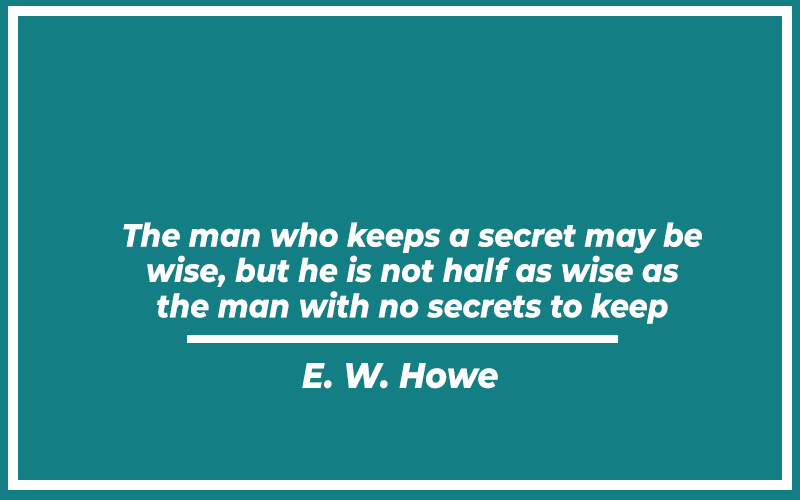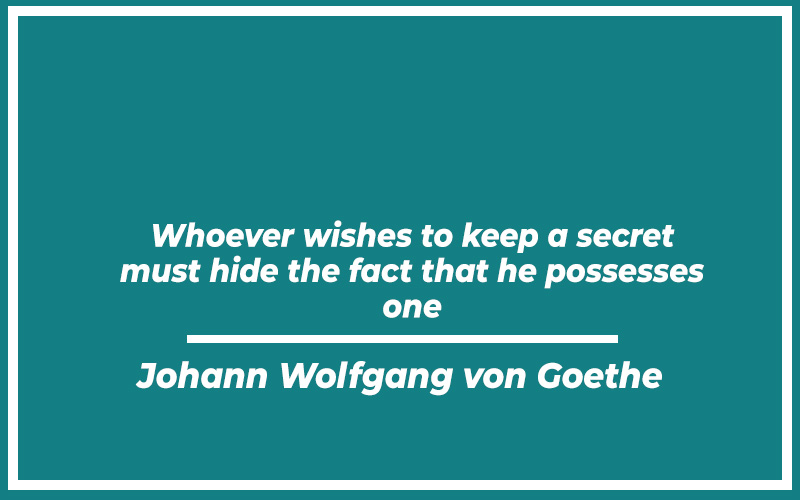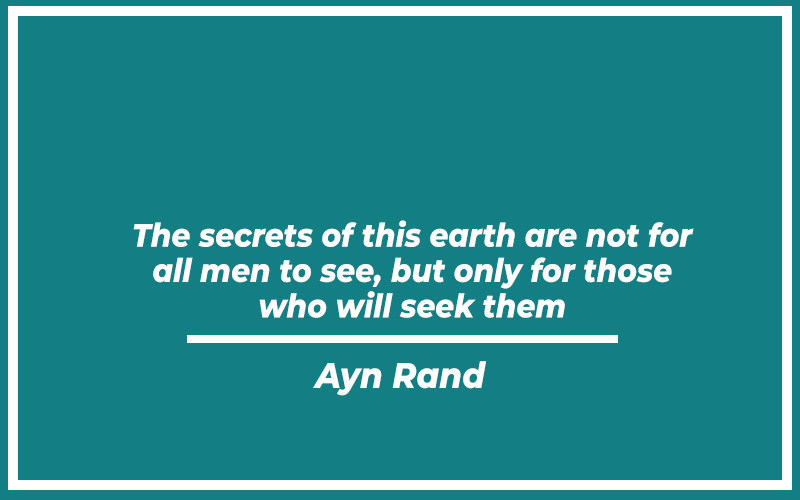Every human being has a secret. It’s a part of life and it is as inevitable as death. While some secrets might be small and silly, others hold immense weight.
These quotes explore the complexities of secrets: the burden they can carry, the comfort they can offer, and the power they hold to shape relationships and lives.
Let’s get started!
Best Quotes About Secrets

“The man who keeps a secret may be wise, but he is not half as wise as the man with no secrets to keep.” – E. W. Howe
E. W. Howe’s quote highlights the value of transparency over secrecy. It suggests that true wisdom lies in living a life free from the burden of secrets. By having nothing to hide, one can live more authentically and without fear of exposure.
This perspective champions honesty and openness as virtues that surpass the cunning required to maintain secrecy. Howe’s insight encourages us to strive for a life of integrity, where our actions and intentions are clear and unburdened by hidden truths.
Also Read: Charles K. Kao Quotes (with Explanation)
“There are no secrets that time does not reveal.” – Jean Racine
Jean Racine’s quote underscores the inevitability of truth coming to light over time. It implies that secrets are temporary and that time has a way of uncovering even the most deeply hidden truths. This perspective highlights the futility of maintaining secrets indefinitely and serves as a reminder that honesty is ultimately the best policy.
Racine’s insight suggests that facing the truth sooner rather than later can prevent the complications and repercussions that arise when secrets are inevitably revealed.
“A secret shared is a trust betrayed.” – Terry McMillan
Terry McMillan’s quote emphasizes the breach of trust that occurs when a secret is shared. It highlights the responsibility that comes with being entrusted with confidential information and the importance of safeguarding it.
This perspective underscores the value of loyalty and discretion in maintaining trust within relationships. McMillan’s insight serves as a reminder of the serious consequences of betraying someone’s confidence and the importance of honoring the trust placed in us by others.
“In order to keep a secret, you must also hide it from yourself.” – George Orwell
George Orwell’s quote delves into the psychological complexity of maintaining secrets. It suggests that true secrecy requires not only hiding information from others but also from oneself. This perspective highlights the mental and emotional toll of secrecy, implying that keeping secrets can lead to self-deception and internal conflict.
Orwell’s insight serves as a reminder of the importance of honesty with oneself and the potential consequences of living a life burdened by hidden truths.
“The best way of keeping a secret is to pretend there isn’t one.” – Margaret Atwood
Margaret Atwood’s quote offers a pragmatic approach to secrecy, suggesting that the best way to keep a secret is to act as though it doesn’t exist. This strategy implies a level of psychological detachment and control, where the secret becomes so well-concealed that it isn’t even acknowledged.
Atwood’s insight highlights the subtle art of discretion and the importance of maintaining a calm and composed demeanor to effectively safeguard confidential information. It serves as a reminder of the nuanced skills required for successful secrecy.
“If you reveal your secrets to the wind, you should not blame the wind for revealing them to the trees.” – Khalil Gibran
Khalil Gibran’s quote uses a poetic metaphor to illustrate the consequences of sharing secrets. It suggests that once a secret is disclosed, it is no longer within our control, akin to telling it to the wind. This perspective emphasizes personal responsibility and the inevitability of secrets being spread once shared.
Gibran’s insight serves as a cautionary reminder to be mindful of whom we confide in and the potential repercussions of revealing confidential information.
“The man who can keep a secret may be wise, but he is not half as wise as the man with no secrets to keep.” – Edgar Watson Howe
Edgar Watson Howe’s quote highlights the wisdom in living transparently without the need for secrecy. While keeping secrets requires discretion and intelligence, the quote suggests that a truly wise person has nothing to hide.
This perspective values honesty and openness, implying that living without secrets is a more straightforward and stress-free approach to life. It encourages integrity and the avoidance of situations that require secrecy, advocating for a life of authenticity and clarity.
“Nothing weighs on us so heavily as a secret.” – Jean de La Fontaine
Jean de La Fontaine’s quote captures the emotional burden that secrets can impose. This statement suggests that the act of keeping something hidden can be more taxing than the secret itself. It highlights the internal struggle and stress associated with secrecy, emphasizing the psychological weight that it places on an individual.
This perspective encourages openness and sharing as a way to relieve this burden, fostering mental and emotional well-being through transparency and honest communication.
“Secrets are made to be found out with time.” – Charles Sanford
Charles Sanford’s quote implies that no secret remains hidden forever. It suggests that the passage of time often reveals the truth, despite efforts to keep it concealed.
This perspective underscores the inevitability of exposure and the transient nature of secrets. It serves as a reminder that honesty is ultimately more sustainable than secrecy, and that facing the truth sooner rather than later can prevent greater issues down the line.
“To keep your secret is wisdom; but to expect others to keep it is folly.” – Samuel Johnson
Samuel Johnson’s quote highlights the personal responsibility in maintaining secrecy. It suggests that while it is wise to keep one’s own secrets, it is unrealistic to expect others to do the same.
This perspective emphasizes the importance of discretion and the inherent risk involved in sharing confidential information. Johnson’s insight encourages individuals to be prudent with their secrets and to recognize the limitations of trust in others, advocating for self-reliance when it comes to sensitive matters.
“He who trusts secrets to a servant makes him his master.” – John Dryden
John Dryden’s quote illustrates the power dynamics involved in sharing secrets. By entrusting a secret to someone, one effectively gives them power over oneself. This perspective highlights the potential vulnerability and loss of control that comes with disclosing confidential information.
Dryden’s insight serves as a cautionary reminder to carefully consider the implications of sharing secrets and to be mindful of the power shifts that can occur as a result, emphasizing the importance of discretion.
“There are no secrets that time does not reveal.” – Jean Racine
Jean Racine’s quote suggests that the passage of time inevitably brings secrets to light. This perspective underscores the idea that no matter how well-hidden, the truth eventually surfaces.
Racine’s statement serves as a reminder of the transient nature of secrecy and the importance of honesty. It implies that living with integrity and openness can prevent the eventual fallout of hidden truths.
“Secrecy is the element of all goodness; even virtue, even beauty is mysterious.” – Thomas Carlyle
Thomas Carlyle’s quote suggests that secrecy adds an element of mystique and allure to goodness, virtue, and beauty. It implies that the unknown or hidden aspects of something can enhance its value and appeal.
Carlyle’s perspective celebrates the idea that not everything needs to be fully revealed or understood to be appreciated. This insight encourages us to embrace the mysterious and enigmatic aspects of life.
Also Read: Top Zach Bryan Quotes (with Explanation)
“Three may keep a secret, if two of them are dead.” – Benjamin Franklin
Benjamin Franklin’s quote humorously underscores the difficulty of maintaining secrets among multiple people. It implies that true secrecy is nearly impossible unless drastically limited to one person.
The insight reflects human nature’s propensity to share information, highlighting the fragility of trust and the potential for betrayal. Franklin’s wit serves as a reminder to be cautious with whom we share our secrets, suggesting that keeping certain things to ourselves is often the best way to ensure their confidentiality.
“The secrets of the heart are not revealed by the tongue.” – Turkish Proverb
This Turkish proverb suggests that the deepest, most personal truths are often left unspoken. It implies that words are inadequate to fully express what lies within the human heart.
The proverb encourages introspection and highlights the complexity of emotions and thoughts that we might choose to keep private. It serves as a reminder that not all secrets need to be shared and that some aspects of our inner selves are meant to remain personal, safeguarded from external scrutiny.
“A secret is like a dove: when it leaves my hand it takes wing.” – Saudi Proverb
The Saudi proverb uses the imagery of a dove to illustrate how easily secrets can spread once shared. It emphasizes the notion that once a secret is told, it is no longer within one’s control, akin to a bird flying away.
This metaphor highlights the importance of discretion and the potential consequences of revealing confidential information. It serves as a cautionary reminder to think carefully before sharing secrets, understanding that once disclosed, they can quickly escape our grasp and be disseminated.

“Whoever wishes to keep a secret must hide the fact that he possesses one.” – Johann Wolfgang von Goethe
Goethe’s quote emphasizes the importance of not only keeping secrets but also concealing the fact that one has them. It suggests that true secrecy requires a dual effort: hiding both the secret and the existence of the secret itself.
This perspective highlights the complexity of maintaining confidentiality and the psychological burden it entails. It serves as a reminder of the careful balance required to truly safeguard secrets, suggesting that discretion and subtlety are crucial components of effective secrecy.
“Confession is not betrayal. What you say or do doesn’t matter; only feelings matter. If they could make me stop loving you—that would be the real betrayal.” – George Orwell
In George Orwell’s “1984,” this quote explores the profound connection between emotions and betrayal. It suggests that true betrayal lies not in actions or words but in the loss of genuine feelings. The quote underscores the importance of emotional fidelity over mere physical or verbal loyalty.
Orwell’s insight delves into the deep psychological and emotional aspects of trust and betrayal, highlighting the complexity of human relationships and the paramount importance of preserving authentic emotional bonds.
“If you have to keep a secret, it’s because you shouldn’t be doing it in the first place.” – David Nicholls
David Nicholls’ quote from “One Day” suggests that the need for secrecy often indicates wrongdoing or ethical ambiguity. It implies that actions requiring secrecy are inherently questionable. This perspective encourages integrity and transparency, advocating for a life led by honesty.
Nicholls’ insight serves as a moral compass, reminding us to evaluate our actions and their implications, promoting ethical behavior that doesn’t necessitate concealment. It underscores the value of living authentically and avoiding situations that compromise our integrity.
“Secrets are lies.” – Dave Eggers
Dave Eggers’ succinct quote from “The Circle” equates secrets with dishonesty. It suggests that the very act of keeping secrets is inherently deceptive. This perspective challenges the morality of secrecy, advocating for complete transparency.
Eggers’ statement provokes reflection on the ethical implications of concealing information, urging a shift towards openness and truthfulness.
“The secrets we keep have a way of bringing us back together.” – Dan Brown
Dan Brown’s quote suggests that secrets can have a unifying effect, potentially drawing people closer when they are finally shared. This perspective views secrets as a dynamic force in relationships, capable of both separating and reconciling individuals.
Brown’s insight indicates that the revelation of secrets can lead to a deeper understanding and stronger bonds. It emphasizes the complex role secrets play in human connections, where their disclosure can lead to healing and reconnection, despite the initial harm they might cause.
“A man is not what he thinks he is, he is what he hides.” – André Malraux
André Malraux’s quote delves into the concept of identity, suggesting that a person’s true nature is revealed by what they conceal. This perspective implies that secrets are a significant aspect of one’s character and personal reality.
Malraux’s insight highlights the contrast between one’s public persona and private self, emphasizing that what is hidden can often be more telling than what is openly shared. This quote encourages introspection about the hidden facets of our lives and how they define who we truly are.
“Nothing makes us so lonely as our secrets.” – Paul Tournier
Paul Tournier’s quote addresses the isolating effect of secrets. It suggests that keeping things hidden from others can create a sense of loneliness and disconnection. This perspective highlights the emotional burden of secrecy and the importance of openness in building meaningful relationships.
Tournier’s observation underscores the value of vulnerability and sharing, as doing so can alleviate loneliness and foster a sense of community and support. It speaks to the human need for connection and the barriers that secrets can create.
“The best way of keeping a secret is to pretend there isn’t one.” – Margaret Atwood
Margaret Atwood’s quote offers a strategy for maintaining secrecy by acting as if no secret exists. This perspective suggests that the act of concealment itself can draw attention, whereas nonchalance can help preserve confidentiality.
Atwood’s insight highlights the psychological aspect of secrets and the power of perception. It implies that how we handle our secrets can determine their longevity and impact. This approach encourages a calm and composed demeanor in safeguarding private information, reducing the risk of unintended disclosure.
“He who has secrets cannot enjoy his wine.” – Proverbs
This proverb implies that the weight of secrets can prevent one from fully enjoying life’s pleasures. It suggests that the mental and emotional burden of keeping secrets detracts from the simple joys and experiences.
This perspective highlights the cost of secrecy on personal well-being and the importance of living authentically. The proverb encourages openness and honesty as a means to achieve a more fulfilling and carefree existence, free from the stress and distraction of hidden truths.
“He that has secrets should not only hide them but hide that he has them.” – Thomas Carlyle
Thomas Carlyle’s quote emphasizes the importance of not just keeping secrets but also concealing the fact that one has them. It suggests that the true art of secrecy involves maintaining an outward appearance of transparency and openness.
Carlyle’s perspective highlights the nuanced skills required for effective secrecy and the importance of discretion.

“The secrets of this earth are not for all men to see, but only for those who will seek them.” – Ayn Rand
Ayn Rand’s quote suggests that the deeper truths and mysteries of the world are reserved for those who actively pursue them. It implies that understanding and uncovering secrets require effort, curiosity, and determination.
Rand’s perspective celebrates the value of seeking knowledge and the rewards that come with uncovering hidden truths. This insight encourages us to be inquisitive and persistent in our quest for understanding.
Also Read: Top Zach Bryan Quotes (with Explanation)
Final Thoughts
Secrets can be a source of protection, shame, or even manipulation. They have the power to damage trust whether it’s in a relationship or within friendship. Other times, when they are revealed, they bring healing and honesty.
In a nutshell, secrets come with consequences. So the best way to handle situations where a secret is very likely to beak a relationship is to have open and honest conversations. This is often the best path for healthy relationships.

